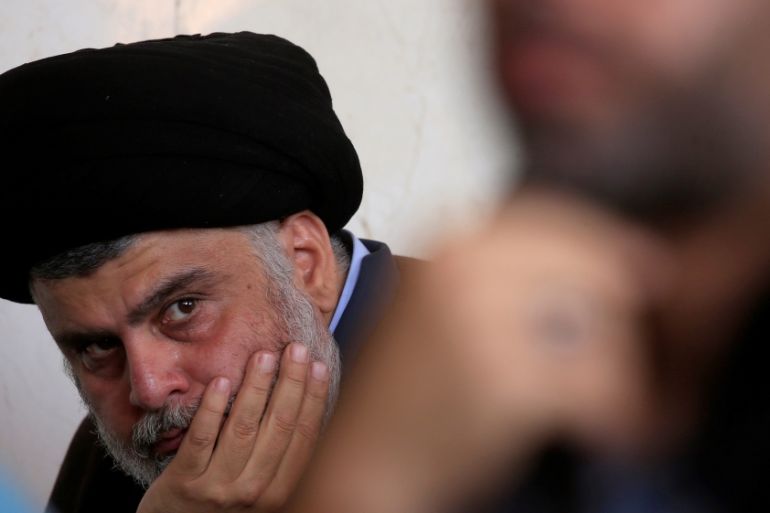Iraq’s Shia leader al-Sadr backs early vote ‘supervised’ by UN
Muqtada al-Sadr said he backed early elections overseen by the UN, warning that further delays would be a ‘disaster’ for Iraq.

Iraqi Shia Muslim leader Muqtada al-Sadr on Wednesday called for early elections overseen by the UN, in a rare news conference outside his home in the southern city of Najaf.
Iraq is expected to hold early parliamentary elections this year, a central demand of an anti-government protest movement which erupted in 2019 and backed by al-Sadr’s supporters.
Keep reading
list of 3 itemsIMF says Iraq seeking emergency loans after oil price plunge
Iraqi cabinet votes to delay general election until October 10
Appearing in a surgical mask and traditional clerical robes, al-Sadr warned against further delays.
“Delaying the elections would be a disaster for Iraq,” said al-Sadr, warning that rival parties would try to rig the vote.
“I don’t want fraud. That’s why I’m asking for UN intervention and supervision,” he said.
In a statement published on his official website, al-Sadr reiterated his call for the UN to supervise the upcoming vote, “on condition that other countries would not to interfere”.
The elections were initially set for June, nearly a year ahead of schedule, but have since been pushed back to October.
The postponement decision came after a proposal by Iraq’s Independent High Election Commission (IHEC), which requested more time to implement the legal and logistical measures needed to hold free and fair elections.
The elections will be taking place under a new electoral law that has reduced the size of constituencies and eliminated list-based voting in favour of votes for individual candidates.
Al-Sadr’s supporters are expected to make significant gains under the new system.
In November, al-Sadr said he would push for the next prime minister to be a member of his movement for the first time.
On Tuesday, leading Sadrist legislator Hakim al-Zameli upped the ante in a televised interview.
“If the premiership goes to any party other than the Sadrist movement, it means the elections are rigged,” he said.
Dire fiscal crisis
His comments came a day after al-Sadr supporters equipped with heavy weapons took to the streets of Najaf and other cities, including the capital, Baghdad.
They stood guard along major highways in a show of force lasting a few hours.
Al-Sadr supporters often hit the streets of Baghdad and the other cities in the south in a show of force, at times rivalling the waning youth-dominated protest movement.
The country is facing its most dire fiscal crisis in decades following a collapse in oil prices earlier this year and the economic impacts of the COVID-19 pandemic, with the government unable to pay public sector salaries on time.
Last year, the Sadrist movement had called for protests to back the reform of what it says is a corrupt state. But young protesters claim that they have been infiltrated by parties like the Sadrist movement and that their movement has essentially been hijacked.
Prime Minister Mustafa al-Kadhimi – who took office in May last year – had promised to hold early elections to appease protesters demanding an overhaul of the country’s political system.
The mass demonstrations began in October 2019, with hundreds of thousands taking to the streets of Baghdad, and across the south to protest against a lack of economic opportunities, endemic corruption and what many see as the malign influence of sectarian interests.
They accused the political elite, especially legislators, of squandering Iraq’s oil wealth to line their own pockets.
Elections in Iraq are sometimes marred by violence and often by fraud.
Voter turnout in Iraq’s last election was 44.5 percent, but especially low in some impoverished southern Shia areas. Many Iraqis say they have no faith in Iraq’s electoral system.
In addition to the economic and health challenges, al-Kadhimi’s government faces challenges from powerful armed groups which oppose him.